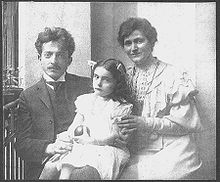Ruth Poritzky
Ruth Rebekka Poritzky , artist name Ruth Porita (born August 24, 1902 in Berlin ; † August 1942 in Auschwitz concentration camp ) was a German opera singer , composer, harpist and organist .
Life
Ruth Poritzky was born in Berlin as the only child of the writer and director Jakob Elias Poritzky and the poet Helene née Orzolkovsky. The mother came from a cantor family. The father, raised in a strictly Orthodox Jewish way, came to Karlsruhe as a child and later joined secular literary circles. Around 1915 he was temporarily employed at the Badisches Landestheater in Karlsruhe, but then returned to Berlin. Ruth stayed with her mother and two aunts in Karlsruhe, where other relatives also lived. She completed a vocal training, presumably with Carl Beines in Darmstadt, and learned piano, organ, guitar and chromatic harp .
Ruth sang soprano , from 1933 mainly in the context of the Jüdischer Kulturbund , and composed a. a. Songs for the synagogue . She soon adopted the stage name “Porita”, perhaps borrowed from the Italian opera world.
She taught at the Munz Conservatory in Karlsruhe and made numerous appearances. In 1934, for example, the Baden Israelitisches Gemeindeblatt reported on one of her appearances at a “family evening ” organized by the Reichsbundischer Jewish Frontsoldaten : “Our local lute singer Ruth Porita delighted in the first part with serious, in the second part with funny, partly self-composed songs to the lute.”
In the 1930s she worked as an organist in the Israelite community in Karlsruhe .
On October 22, 1940 Ruth was with her mother and several thousand Jewish people from southwestern Germany after the southern French Gurs abducted , where they lived under very difficult conditions until the summer 1942nd From the transit camp Drancy were both on 12 August 1942 from Auschwitz-Birkenau deported and were murdered there.
literature
- Paul Frank et al. Wilhelm Altmann (Ed.): Kurzgefasstes Tonkünstler-Lexikon , 15th edition, Wilhelmshaven 1971, ISBN 3 7959 0083 2
- Josef Werner: swastika and Jewish star. The fate of the Karlsruhe Jews in the Third Reich . Karlsruhe: Badenia, 2nd ed. 1990, pp. 89 and 406
Web links
- Ruth Rebekka Poritzky in: Memorial Book for the Karlsruhe Jews , as of 2020
- Jacob Elias Poritzky , a selection of works
Individual evidence
- ↑ cf. German Stage yearbook born in 1922 and 1924
- ↑ Israelitisches Gemeindeblatt, Edition B , 12th year 1934, No. 12 of December 15, 1934, p. 14.
- ↑ cf. Israelitisches Gemeindeblatt, Issue B , 14th year 1936, No. 23 of 9 December 1936, p. 7.
| personal data | |
|---|---|
| SURNAME | Poritzky, Ruth |
| ALTERNATIVE NAMES | Poritzky, Ruth Rebekka (full name); Porita, Ruth |
| BRIEF DESCRIPTION | German opera singer (soprano), composer, harpist and organist |
| DATE OF BIRTH | August 24, 1902 |
| PLACE OF BIRTH | Berlin |
| DATE OF DEATH | August 1942 |
| Place of death | Auschwitz concentration camp |

